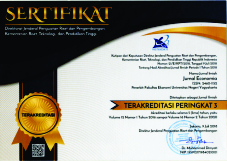Descriptive Study of Government Expenditure & Poverty Reduction in South Halmahera, Indonesia (Maqashid Sharia Approach)
Downloads
Abstract
Government intervention plays an important role in reducing poverty in South Halmahera as an antithesis to when market mechanisms fail to distribute wealth. From the Islamic public finance perspective, the ulil-amri (the government) plays a central role in managing public budget and is subject to the sharia value system. This research descriptively explores how the SH government manages its expenditure side for poverty alleviation and tries to conceptualize direct spending using the 2019 APBD(The Regional Revenue and Expenditure Budget) sample with the maqashid sharia approach. The results show that government spending brings benefits to the poor, but unfortunately an increase in spending does not always reduce poverty. During the COVID-19 pandemic, budget refocusing was quite successful in reducing poverty. Meanwhile, the expenditure allocation according to the maqashid sharia indicator has reached 69% of the total direct expenditure, although the expenditure allocation for religious protection received the smallest portion, 0.42%.
Keywords:Poverty, Government Expenditure, Budget Refocusing, Maqashid Sharia
Downloads
Ahmat Sarwat, Lc., M. (2019). Maqashid Syariah, (Cet.I, Jakarta: Rumah fiqih Publishing,2019), h.59. 1–67.
Arif, F. M. (2019). Anggaran Belanja Daerah Berbasis Maqasid al Syari'ah: Analisis Realisasi Anggaran Kota Palopo. INFERENSI: Jurnal Penelitian Sosial Keagamaan, 13(1), 51–74. https://doi.org/10.18326/infsl3.v13i1.51-74
BPS Halmahera Selatan. (2020). Statistik Daerah Kab. Halmahera Selatan.
BPS Halmahera Selatan. (2021). Kecamatan Obi Dalam Angka 2021.
BPS Maluku Utara. (2020). Profil Kemiskinan Provinsi Maluku 2019. In Badan Pusat Statistik Maluku Utara.
Chapra, M. U. (2000). Sistem Moneter Islam. Jakarta: Gema Insani Press, Jakarta & Tazkia Cendikia.
Chapra, M. U. (2001). The future of economics: An Islamic perspective. Jakarta: Gema Insani Press, Jakarta & Tazkia Cendikia.
Duflo, E. (1999). Essays in empirical development economics. Massachusetts Institute of Technology.
Fadly, F., Inat, F., Iryanto, M., & Quilim, C. A. (2021). Analisis Pengaruh Pembiayaan Bank Syariah, Belanja Pemerintah dan Pertumbuhan Ekonomi terhadap Tingkat Kemiskinan di Kota Ternate. Jurnal Ilmiah Ekonomi Islam, 7(1), 123. https://doi.org/10.29040/jiei.v7i1.1858
Kartika, D. W., & Fauzi, R. M. Q. (2020). Kebijakan Kepemimpinan Walikota Surabaya Dalam Mengambil Keputusan Di Bidang Ekonomi Yang Berbasis Maqashid Syariah. Jurnal Ekonomi Syariah Teori Dan Terapan, 6(2), 353. https://doi.org/10.20473/vol6iss20192pp353-371
Lubis, D. (2013). Penyusunan Anggaran Belanja Daerah dengan Pendekatan Ad-Daruriyyat Al-Khams/Maqasid As-Syariah: Studi Kasus APBD Kabupaten Bogor Tahun 2011. Al-Muzara'ah, 1(2), 119–138. https://doi.org/10.29244/jam.1.2.119-138
Mannan, M. A. (1995). Teori dan Praktek Ekonomi Islam (D. H. M. Sonhadji & Dkk, Eds.). Yogyakart: PT Dana Bakti Wakaf, Yogyakarta.
Miles, M. B., & Huberman, A. M. (2009). Analisis Data Kualitatif: Buku Sumber Tentang Metode-metode Baru. Jakarta: U.I. Press.
Miletzki, J., & Broten, N. (2017). Development as freedom. In Development as freedom. https://doi.org/10.4324/9781912281275
Sen, A. (1990). Development as capability expansion. In Human Development and the International Development Strategy for the 1990s (pp. 41–58). London: Palgrave Macmillan UK. https://doi.org/10.1007/978-1-349-21136-4_3
Sepulveda, C. F., & Martinez-Vazquez, J. (2011). The consequences of fiscal decentralization on poverty and income equality. Environment and Planning C: Government and Policy, 29(2), 321–343. https://doi.org/10.1068/c1033r
Todaro, M. P., & Smith, S. C. (2011). Pembangunan Ekonomi (11th ed.). Penerbit Erlangga, Jakarta.
Utama, S. B., & Kustiani, N. A. (2012). Analisis Pengaruh Belanja Daerah Klasifikasi Fungsi Terhadap Pengentasan Kemiskinan di Era Desentralisasi Fiskal (Studi Kasus Pada Kabupaten/Kota di Pulai Jawa & Bali). Jakarta.
Yudo, S., & Hernaningsih, T. (2021). Kondisi Kualitas Dan Kebutuhan Air Desa Kawasi Di Kawasan Pertambangan Nikel Pulau Obi. Jurnal Rekayasa Lingkungan, 14(1), 1–13. https://doi.org/10.29122/jrl.v14i1.4913
Copyright (c) 2024 Jurnal Economia

This work is licensed under a Creative Commons Attribution 4.0 International License.















